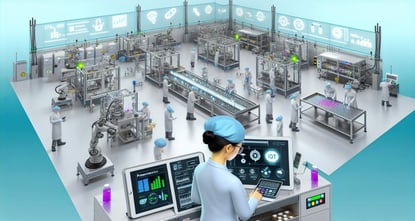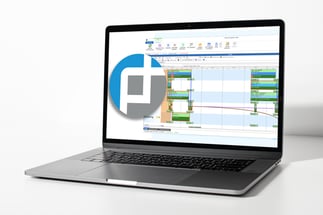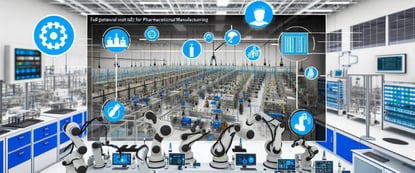Integrating IoT Devices for Real-time Monitoring and Control
Every minute counts, and any delay or inefficiency can have significant impacts on production timelines, regulatory compliance, and ultimately, patient well-being. As an Operations Director in a pharmaceutical manufacturing facility, you're likely familiar with the challenges of optimizing production processes while ensuring compliance, quality, and safety standards. Fortunately, advancements in technology, particularly the integration of IoT (Internet of Things) devices, offer innovative solutions to enhance real-time monitoring and control of manufacturing equipment.
In this blog, we'll look into the significance of integrating IoT devices into pharmaceutical manufacturing operations, the benefits it brings, and how seamless integration with existing ERP (Enterprise Resource Planning), SCM (Supply Chain Management), and MES (Manufacturing Execution System) systems can amplify these advantages. Specifically, we'll explore the integration between PlanetTogether, a leading production planning and scheduling software, and major ERP, SCM, and MES systems such as SAP, Oracle, Microsoft, Kinaxis, and Aveva.

IoT Integration in Pharmaceutical Manufacturing
IoT devices, equipped with sensors and connectivity capabilities, have revolutionized the way manufacturing processes are monitored and controlled. These devices enable real-time data collection, analysis, and decision-making, thereby optimizing operational efficiency and minimizing downtime.
In pharmaceutical manufacturing, where precision and compliance are paramount, IoT integration offers several compelling advantages:
Real-Time Monitoring: IoT devices installed on manufacturing equipment provide continuous data streams on various parameters such as temperature, pressure, humidity, and machine status. This real-time monitoring enables proactive maintenance, early detection of anomalies, and swift response to deviations, ensuring consistent product quality and compliance with regulatory standards.
Predictive Maintenance: By analyzing the data generated by IoT devices, predictive maintenance algorithms can anticipate equipment failures before they occur. This predictive approach minimizes unplanned downtime, reduces maintenance costs, and prolongs the lifespan of critical assets, ultimately enhancing overall equipment effectiveness (OEE).
Enhanced Quality Control: IoT-enabled sensors facilitate comprehensive monitoring of production processes, allowing for precise control over critical variables. This granular oversight enables early identification of quality issues, rapid corrective action, and continuous process improvement, thereby elevating product quality and customer satisfaction.
Regulatory Compliance: In the highly regulated pharmaceutical industry, adherence to strict compliance standards is non-negotiable. IoT integration facilitates automated data capture and documentation, simplifying regulatory reporting and audit processes. Furthermore, real-time monitoring capabilities ensure that production activities remain within predefined operational limits, mitigating compliance risks.

The Role of PlanetTogether in IoT Integration
PlanetTogether, a leading provider of production planning and scheduling software, plays a pivotal role in orchestrating the integration of IoT devices within pharmaceutical manufacturing facilities. By seamlessly integrating with existing ERP, SCM, and MES systems, PlanetTogether enables holistic visibility and control across the entire production landscape.
Let's explore how PlanetTogether's integration with prominent ERP, SCM, and MES systems enhances the effectiveness of IoT-driven manufacturing operations:
SAP Integration: For pharmaceutical companies leveraging SAP ERP solutions, integration with PlanetTogether streamlines production planning and scheduling processes. Real-time data from IoT devices can be seamlessly incorporated into SAP's centralized database, enabling synchronized planning activities and facilitating data-driven decision-making.
Oracle Integration: By integrating with Oracle ERP systems, PlanetTogether ensures seamless data exchange between production planning and execution stages. IoT-generated insights on equipment performance and resource utilization are integrated into Oracle's robust platform, empowering Operations Directors to optimize production schedules in alignment with business objectives.
Microsoft Integration: With its compatibility with Microsoft Dynamics ERP solutions, PlanetTogether offers a unified platform for production planning and execution. IoT data feeds seamlessly into Microsoft's ecosystem, enabling Operations Directors to leverage advanced analytics and visualization tools for enhanced decision support.
Kinaxis Integration: Pharmaceutical manufacturers utilizing Kinaxis RapidResponse for supply chain planning can harness the power of IoT integration through PlanetTogether. By synchronizing production schedules with supply chain dynamics in real-time, this integration ensures optimal inventory management and responsiveness to market demands.
Aveva Integration: Integration between PlanetTogether and Aveva's MES solutions enables end-to-end visibility and control over manufacturing operations. IoT data captured at the shop floor level is seamlessly transmitted to Aveva's MES platform, facilitating real-time monitoring, process optimization, and compliance assurance.

Unlocking the Full Potential
While the integration of IoT devices with PlanetTogether and existing ERP, SCM, and MES systems offers tremendous value, realizing its full potential requires strategic planning and execution. Here are some key considerations for Operations Directors looking to maximize the benefits of IoT integration:
Define Clear Objectives: Clearly articulate the desired outcomes and performance metrics associated with IoT integration, such as improved equipment uptime, enhanced product quality, or reduced cycle times. Align these objectives with broader business goals to ensure alignment and prioritization.
Select Appropriate IoT Devices: Choose IoT devices that are tailored to the specific requirements of pharmaceutical manufacturing processes. Consider factors such as sensor accuracy, connectivity protocols, and compatibility with existing infrastructure to maximize interoperability and data reliability.
Establish Robust Data Governance: Develop robust data governance policies and procedures to ensure the integrity, confidentiality, and availability of IoT-generated data. Define roles and responsibilities for data stewardship, establish data quality standards, and implement secure data transmission protocols to mitigate cybersecurity risks.
Leverage Advanced Analytics: Harness the power of advanced analytics and machine learning algorithms to derive actionable insights from IoT data. Invest in analytical tools that enable predictive modeling, anomaly detection, and prescriptive analytics to drive continuous improvement and operational excellence.
Foster Cross-Functional Collaboration: Facilitate cross-functional collaboration between production, maintenance, quality assurance, and IT teams to leverage IoT integration effectively. Encourage knowledge sharing, interdisciplinary problem-solving, and continuous learning to foster a culture of innovation and agility.
The integration of IoT devices for real-time monitoring and control of manufacturing equipment represents a paradigm shift in pharmaceutical manufacturing operations. By seamlessly integrating with leading ERP, SCM, and MES systems such as SAP, Oracle, Microsoft, Kinaxis, and Aveva, PlanetTogether enables Operations Directors to harness the full potential of IoT-driven insights.
From proactive maintenance and enhanced quality control to regulatory compliance and operational efficiency, the benefits of IoT integration are manifold. By embracing this transformative technology and adopting a strategic approach to implementation, pharmaceutical manufacturers can stay ahead of the curve, drive sustainable growth, and deliver superior value to customers and stakeholders alike.
As an Operations Director, the journey towards IoT-enabled manufacturing excellence begins with a clear vision, a robust strategy, and a commitment to continuous innovation. Embrace the possibilities, seize the opportunities, and embark on a transformative journey towards operational excellence in the digital age.
Are you ready to take your manufacturing operations to the next level? Contact us today to learn more about how PlanetTogether can help you achieve your goals and drive success in your industry.